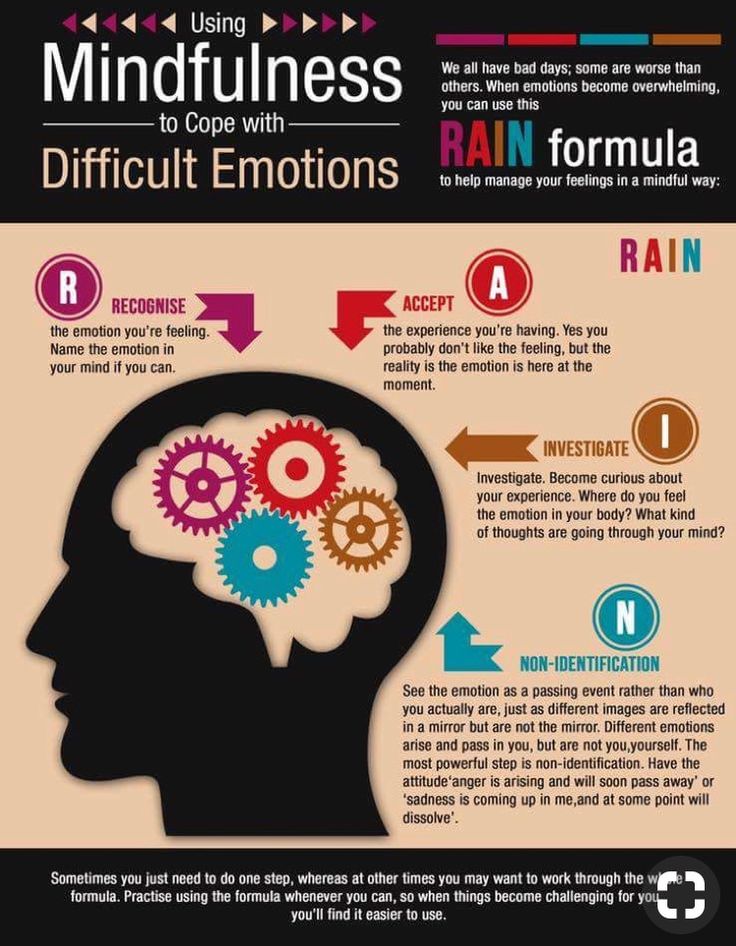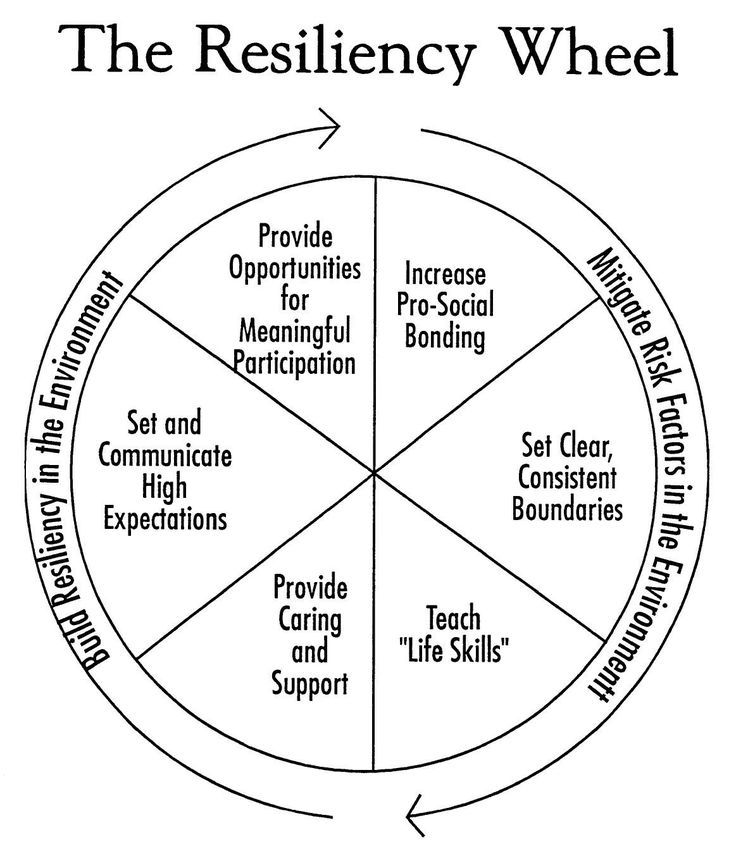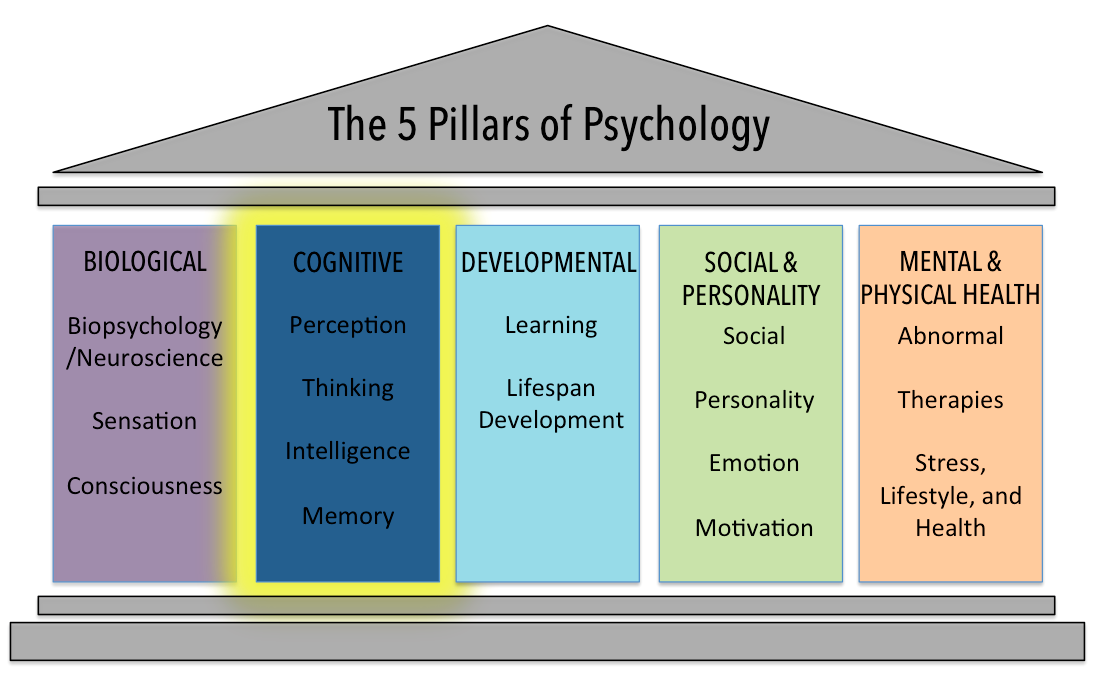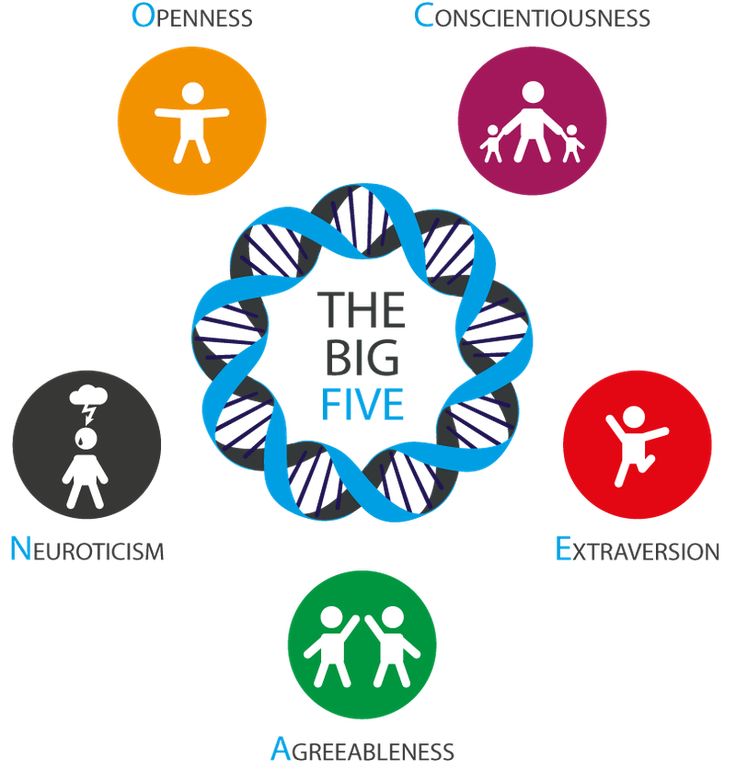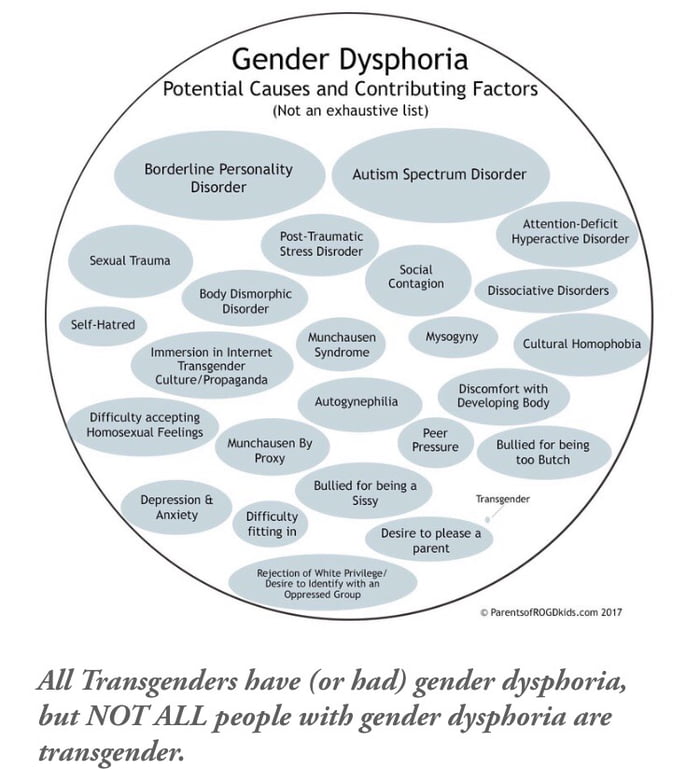Ways to cope with anger
8 ways to deal with anger | Coping
Learning how to cope if you struggle with rage can be difficult – but there are ways you can learn to manage your anger.
How to deal with anger?
The first thing to know about learning to manage anger issues is: anger isn’t actually a ‘bad’ emotion. There’s nothing wrong with feeling rage or frustration, but what does matter is how you deal with your anger and how you express it.
If you learn anger management skills and learn how to recognise and manage your anger in a healthy way, you’ll look less like this:
and more like this:
We’re not guaranteeing you won’t still be in a bad mood, but you’ll be less likely to act in a way you might regret.
Here are our tips for the best way to control your anger.
1. Recognise the warning signs
If you can recognise when you’re starting to feel angry, you’ll be in a good place to try some of our tips before you get really worked up or lash out. You can then try a few of the strategies below. Some warning signs are:
- pounding heart
- gritting your teeth
- sweating
- tight chest
- shaking
- feeling anxious
- raising your voice
- being snappy or defensive
- temporarily losing your sense of humour
- pacing
- getting a ‘flash’ of a bad mood
- being overly critical of someone
- feeling argumentative
Acknowledging that you feel angry and identifying the emotions you're feeling can sometimes help to reduce the intensity. Saying "I'm angry right now" or "I'm feeling frustrated and annoyed" can be the first step in understanding and resolving your feelings of anger.
2. Work out why you’re angry
There’s lots of reasons why you might be angry. It’s a normal or understandable response in some situations, such as when you or someone else is being treated unfairly. If you’re not sure why you’ve just snapped at someone, though, think back through your day and try to pinpoint what set you off.
Some other reasons why you might be feeling angry include:
- you’re under a lot of pressure
- you’re experiencing bodily or hormonal changes that cause mood swings
- you’re frustrated with how your life is going
If you work on first recognising and then dealing with your anger, it won’t have such a damaging effect on your relationships, body, mind and emotions.
3. Write it down
Sometimes, writing stuff down can help you work out why you’re feeling angry and how you might be able to deal with it. Try drafting a letter to someone to explore what you think is making you angry, how you're responding to the situation and how you want to address your feelings. Take a pause before sending it and read back over your letter. This method will allow you to express your feelings, while reading over your words will help you to put things in perspective. You may find you don't need to send the letter as your feelings subside after writing, or writing it down may help you find the right words that you can use in a discussion.
4. Count to 100
This one seems pretty basic, but it works really well for anger management. Thinking about something other than what’s making you upset for 100 seconds can help you avoid blowing a fuse. It gives you a chance to gather yourself and your thoughts before you do anything else.
5. Press pause
When you feel angry about something, it’s almost impossible to deal with the situation in a productive or helpful way. If you feel yourself losing your cool, just walk away from the situation for a while. You’ll deal with it better when everyone, yourself included, is feeling calmer.
6. Move your body
Exercise is an awesome way to let off steam. You could take a walk around the block, go for a run, or do something really high-energy like boxing.
7. Talk to someone
Talking to someone you trust about how you’re feeling can take a weight off your shoulders as well as your mind. That could be a trusted adult, friend or family member. You could even join ReachOut's Online Community and talk with other young people who get how you’re feeling and can share their own anger management strategies.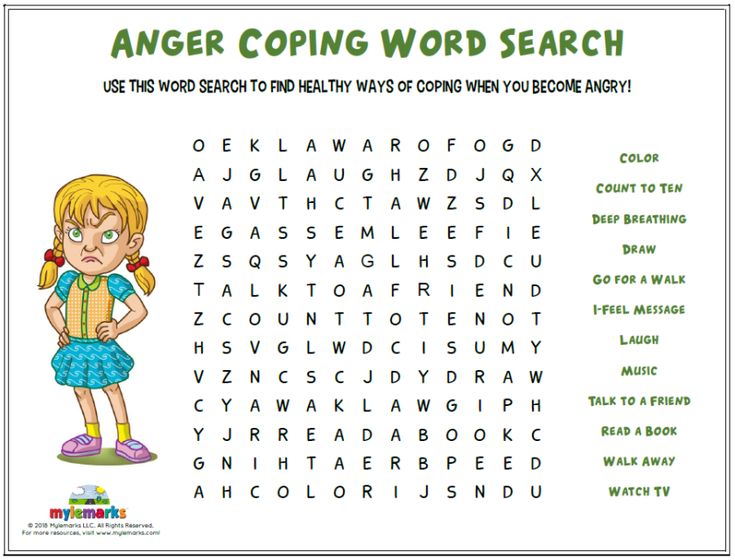
If your anger is getting out of control, or you think you or someone in your life meets the criteria for a personality disorder, consider seeing a mental health professional. Watch our video to find out why talking helps.
8. Take time to relax
If you know what helps you to relax, you’ll find it really useful whenever you’re feeling angry. Take some time out to do something you enjoy, it could be:
- going for a walk in the park
- reading a book
- trying some meditation
- listening to music
- relaxation apps like Smiling Mind
25 Tips to Manage Your Anger and Feel Calmer
Anger is a normal feeling and can be a positive emotion when it helps you work through issues or problems, whether that’s at work or at home.
However, anger can become problematic if it leads to aggression, outbursts, or even physical altercations.
Anger control is important for helping you avoid saying or doing something you may regret.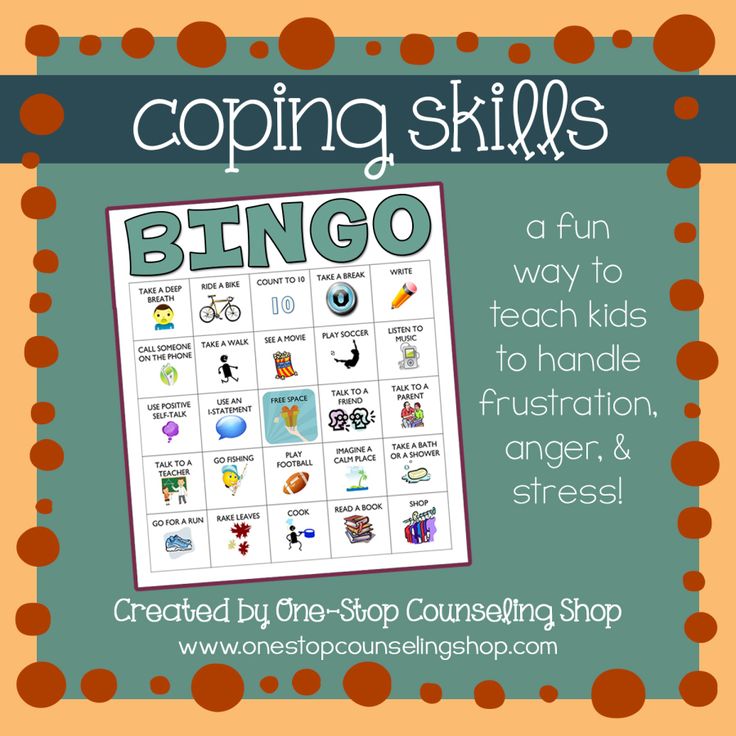 Before anger escalates, you can use specific strategies for controlling anger.
Before anger escalates, you can use specific strategies for controlling anger.
Here are 25 ways you can control your anger:
1. Count down
Count down (or up) to 10. If you’re really mad, start at 100. In the time it takes you to count, your heart rate will slow, and your anger will likely subside.
2. Take a breather
Your breathing becomes shallower and speeds up as you grow angry. Reverse that trend (and your anger) by taking slow, deep breaths from your nose and exhaling out of your mouth for several moments.
3. Go walk around
Exercise can help calm your nerves and reduce anger. Go for a walk, ride your bike, or hit a few golf balls. Anything that gets your limbs pumping is good for your mind and body.
4. Relax your muscles
Progressive muscle relaxation calls on you to tense and slowly relax various muscle groups in your body, one at a time. As you tense and release, take slow, deliberate breaths.
5. Repeat a mantra
Find a word or phrase that helps you calm down and refocus.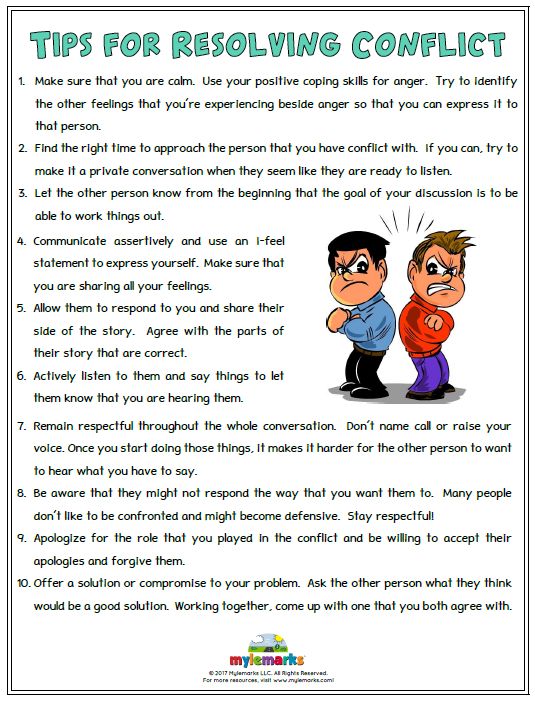 Repeat that word again and again to yourself when you’re upset. “Relax,” “Take it easy, and “You’ll be OK” are all good examples.
Repeat that word again and again to yourself when you’re upset. “Relax,” “Take it easy, and “You’ll be OK” are all good examples.
6. Stretch
Neck rolls and shoulder rolls are good examples of nonstrenuous yoga-like movements that can help you control your body and harness your emotions. No fancy equipment required.
7. Mentally escape
Slip into a quiet room, close your eyes, and practice visualizing yourself in a relaxing scene. Focus on details in the imaginary scene: What color is the water? How tall are the mountains? What do the chirping birds sound like? This practice can help you find calm amidst anger.
8. Play some tunes
Let music carry you away from your feelings. Put in earbuds or slip out to your car. Crank up your favorite music and hum, bop, or sashay your anger away.
9. Stop talking
When you’re steamed, you may be tempted to let the angry words fly, but you’re more likely to do harm than good. Pretend your lips are glued shut, just like you did as a kid. This moment without speaking will give you time to collect your thoughts.
This moment without speaking will give you time to collect your thoughts.
10. Take a timeout
Give yourself a break. Sit away from others. In this quiet time, you can process events and return your emotions to neutral. You may even find this time away from others is so helpful you want to schedule it into your daily routine.
11. Take action
Harness your angry energy. Sign a petition. Write a note to an official. Do something good for someone else. Pour your energy and emotions into something that’s healthy and productive.
12. Write in your journal
What you can’t say, perhaps you can write. Jot down what you’re feeling and how you want to respond. Processing it through the written word can help you calm down and reassess the events leading up to your feelings.
13. Find the most immediate solution
You might be angry that your child has once again left their room a mess before going to visit a friend. Shut the door. You can temporarily end your anger by putting it out of your view. Look for similar resolutions in any situations.
Look for similar resolutions in any situations.
14. Rehearse your response
Prevent an outburst by rehearsing what you’re going to say or how you’re going to approach the problem in the future. This rehearsal period gives you time to role-play several possible solutions, too.
15. Picture a stop sign
The universal symbol to stop can help you calm down when you’re angry. It’s a quick way to help you visualize the need to halt yourself, your actions, and walk away from the moment.
16. Change your routine
If your slow commute to work makes you angry before you’ve even had coffee, find a new route. Consider options that may take longer but leave you less upset in the end.
17. Talk to a friend
Don’t stew in the events that made you angry. Help yourself process what happened by talking with a trusted, supportive friend who can possibly provide a new perspective.
18. Laugh
Nothing upends a bad mood like a good one. Diffuse your anger by looking for ways to laugh, whether that’s playing with your kids, watching stand-up, or scrolling memes.
19. Practice gratitude
Take a moment to focus on what’s right when everything feels wrong. Realizing how many good things you have in your life can help you neutralize anger and turn around the situation.
20. Set a timer
The first thing that comes to mind when you’re angry likely isn’t the thing you should say. Give yourself a set time before you respond. This time will help you be calmer and more concise.
21. Write a letter
Write a letter or email to the person that made you angry. Then, delete it. Often, expressing your emotions in some form is all you want, even if it’s in something that will never be seen.
22. Imagine forgiving them
Finding the courage to forgive someone who has wronged you takes a lot of emotional skill. If you can’t go that far, you can at least pretend that you’re forgiving them, and you’ll feel your anger slip away.
23. Practice empathy
Try to walk in the other person’s shoes and see the situation from their perspective.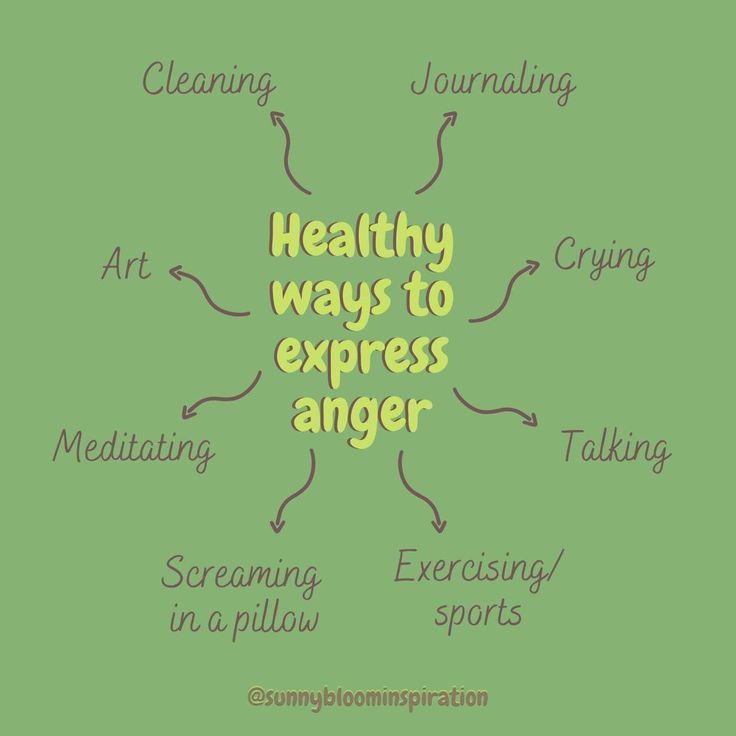 When you tell the story or relive the events as they saw it, you may gain a new understanding and become less angry.
When you tell the story or relive the events as they saw it, you may gain a new understanding and become less angry.
24. Express your anger
It’s OK to say how you feel, as long as you handle it in the right way. Ask a trusted friend to help you be accountable to a calm response. Outbursts solve no problems, but mature dialogue can help reduce your stress and ease your anger. It may also prevent future problems.
25. Find a creative channel
Turn your anger into a tangible production. Consider painting, gardening, or writing poetry when you’re upset. Emotions are powerful muses for creative individuals. Use yours to reduce anger.
The bottom line
Anger is a normal emotion that everyone experiences from time to time. However, if you find your anger turns to aggression or outbursts, you need to find healthy ways to deal with anger.
If these tips don’t help, consider talking with your doctor. A mental health specialist or therapist can help you work through underlying factors that may contribute to anger and other emotional issues.
15 Ways to Deal with Anger
38,789
Know Yourself A Human Being Among Humans
Sometimes we think that being angry is bad. This is wrong. Anger is a natural reaction when we feel threatened. In this state, the heart begins to beat faster, the face turns pale or flushed, breathing quickens. From an evolutionary point of view, such reactions prepare the body to fight off a predator or to immediately escape.
But this medal also has a downside: too much energy is wasted on anger. The tension it causes can destroy the body. Excessive aggression, both expressed and suppressed, increases the risk of cardiovascular disease. Plus, it's hard to think clearly when your mind is clouded by rage and your adrenaline is running high. Here are some tips to help you manage your anger without hurting yourself.
1. Admit that you are angry
The first step is awareness. Acknowledge your feelings. Some of us find it easier to separate ourselves from anger, emotionally distance ourselves, and not identify with it. You are not the embodiment of anger.
You are not the embodiment of anger.
2. Breathe slowly and deeply from the diaphragm
Anger provokes a state of vegetative excitement, deep breathing helps to neutralize it. Exhalations should be longer than inhalations.
3. Ask yourself what threatens you
What is at risk: your body, personal or professional relationships, financial condition or self-esteem? Are you at risk right now? If yes, act now. Take care of yourself.
4. Don't jump to conclusions
Perhaps the colleague who didn't greet you was deep in thought or feeling unwell. Try not to jump to conclusions like "he doesn't like me" or "nobody likes me". It is better to ask a colleague how he is doing now or later.
5. Redefine expectations
Often we live with unrealistic expectations and we don't even realize it. But how can everything turn out just the way we want?
We dream of a harmonious life, but reality is full of obstacles. It is time to finally admit that we will have to face difficulties every now and then, and then when we meet with them, anger will not flare up with such force.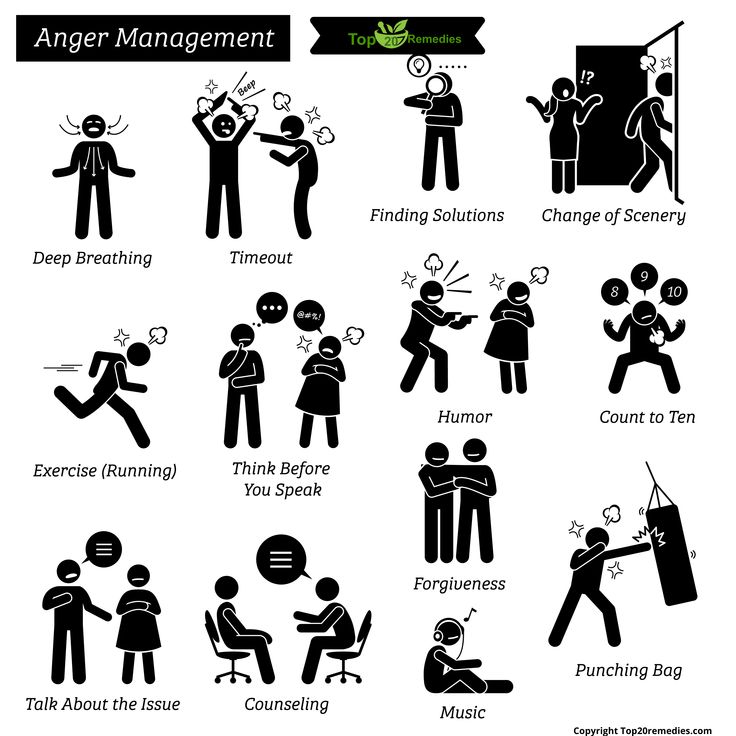
Drop thoughts like "he shouldn't have done this" and categorical statements like "always" or "never". Usually such judgments are subjective and erroneous.
Try not to dramatize the situation, don't think that someone wants to harm you
Let's say you hate being stuck in a traffic jam. This is understandable - who likes to sit in a car for hours, moving at a speed of eight kilometers per hour? But what do you usually say to yourself in such cases? What shouldn't be? That other drivers are idiots? It only fuels anger.
Look at the situation from the other side: "Well, this is an integral part of living in a big city" or "But I can listen to an audiobook." Most likely, your anger will subside.
6. Learn to apply cognitive restructuring
Don't exclaim, "This is terrible, I can't stand it!" Try saying, "Yes, it's annoying, but I can fix this problem." These two approaches give completely different results.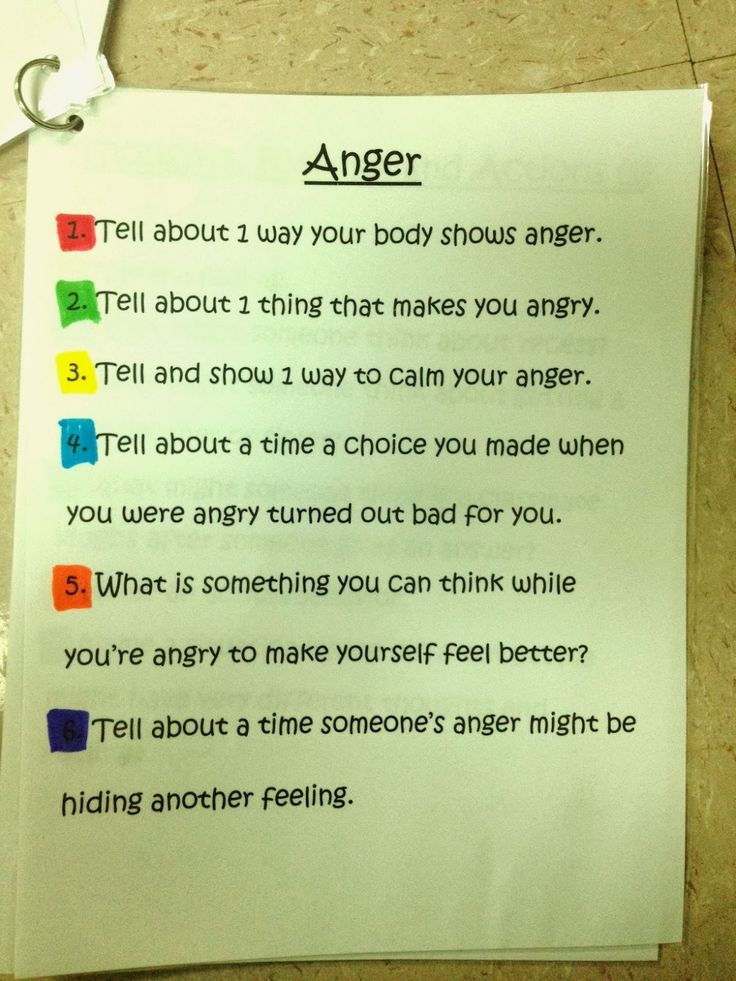
Try not to dramatize the situation, do not think that someone wishes you harm. Understand the difference between a desire and a demand. When talking to others or to yourself, use the phrases “I would like” or “I would prefer” instead of “I insist” and “you must.”
7. Ask yourself what your anger is based on
Anger makes us feel "strong" and "tough", but it's not easy to show vulnerability. But by analyzing your pain, you can better understand yourself. Anger often masks other emotions, such as sadness or fear.
8. Do not use anger as a motivation
It is believed that anger should be released, but this is a mistake. In this way, you can influence the behavior of others, but such changes will not last long. Who likes to be bullied?
9. Practice self-compassion
Admit to yourself that you are experiencing unpleasant feelings. This experience is somehow familiar to all people on the planet. Being aware of this fact will help you deal with your anger without hurting yourself or others.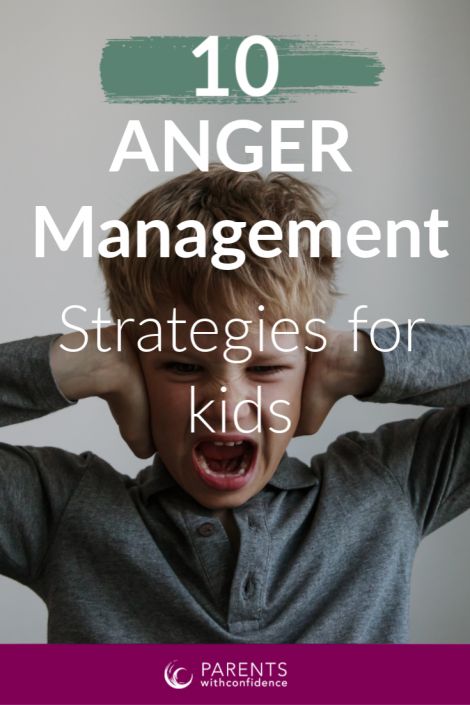 Your emotions should not control your actions.
Your emotions should not control your actions.
10. Get moving
Take up running, Nordic walking or yoga. This will help lower the levels of hormones that cause stress and anger, and increase serotonin and dopamine levels, which will improve your mood.
11. Talk to a close friend
Someone who knows you well can look at the situation differently and help you do the same.
12. Be aware of your feelings and needs
Use "I-statements" when expressing feelings. Don't criticize or blame others. Try to take feedback from others without becoming defensive or argumentative.
13. Concentrate on the solution
Once you have realized that you are angry and understand why you feel threatened, focus on finding solutions to the problem. So you direct your energy in a peaceful direction.
14. Use anger as a clue
My father and I used to get into heated discussions. When my mother asked: “Why are you swearing again?”, Father answered: “We don’t swear, we are just passionate!” We expressed our emotions without anger and resentment.
What hurts you can tell you exactly how you could benefit the world. Are you upset by the situation with homeless animals? Help a dog shelter. Outraged by the situation of the poor? Become a volunteer at a social assistance center.
15. Practice mindfulness
Don't judge yourself for being angry - that will only make you more irritable and exacerbate the problem. Try to accept the fact that you are angry. Don't let anger control your actions, but don't deny it either. Admit anger and refrain from judgment. Your goal is to understand what's going on. You can then use the tips above to mobilize, focus, and channel your anger in a constructive way.
Anger in itself is not bad, but we must be able to control it so that it does not poison our lives and relationships with others.
About the author: Rachel Finzi is a psychotherapist at UCLA.
Text: Zhanna Omelianenko Photo Source: Getty Images
New on the site
How to speak so that your partner understands? 5 tips from psychological practice
How to cope with laziness: advice from a psychologist - take action
“A teenage son suddenly began to avoid hugs.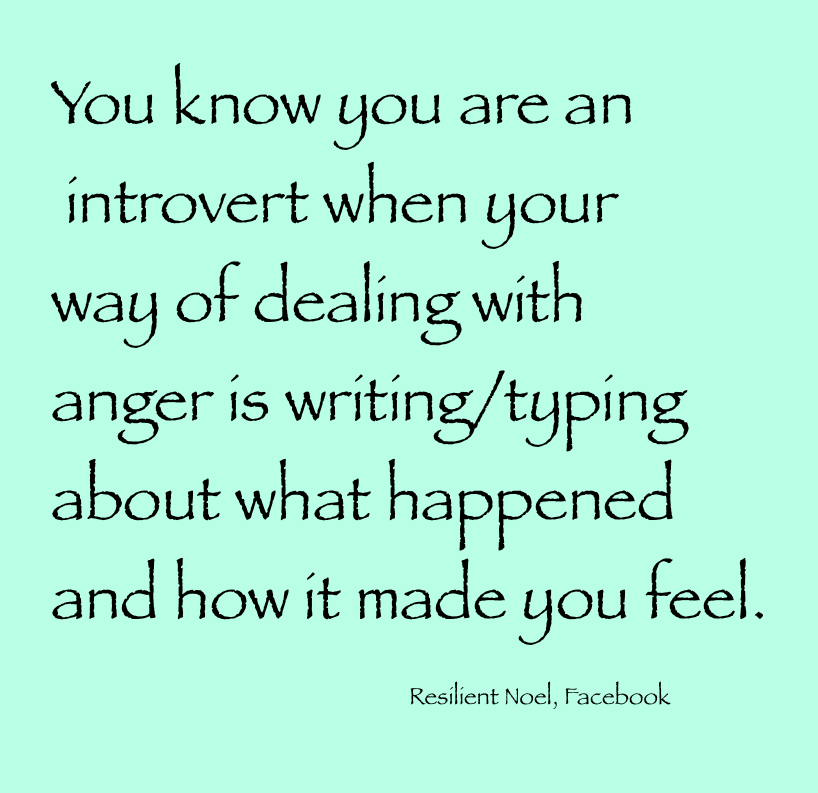 This is fine?"
This is fine?"
4 Signs You're Not Knowing Yourself
"A Good Enough Mother": How Donald Woods Winnicott Taught Us to Stop Worrying and Love Parenting - 4 Key Ideas Helping Children”
How to deal with anger: 6 ways for people with high emotional intelligence
88 521
Knowing Yourself A Human Among Humans Practices how to
Our anger, both overt and covert, is meant to convey something important to those around us, but it also pushes them away. We sincerely want to be heard and understood, but we get the opposite result. In whatever form we express aggression, it interferes with building effective communication.
Many people think that a passive-aggressive style of interaction is better and "more pleasant" than open outbursts of rage, but this is not so. The French designate passive aggression with the phrase sous-entendu (“hint”, “reticence”).
We seem to pronounce quite innocent words, but in reality we mean something completely different, evil and cruel end the conversation.
So, if you are looking for an honest and productive dialogue, you should look for another strategy.
How to express negative emotions and not destroy relationships?
1. Listen to yourself and be aware of what is happening
Even if you are just seething with anger, it is better to wait it out - otherwise communication will go down the wrong path. When we are angry, the brain is captured by this emotion and we cannot think of anything else. The amygdala, the emotional center of the brain, is so active that it's hard for us to think logically.
Take a walk and take a deep breath, distract yourself with a funny video, meditate, pray - use any technique that will help you regain your composure. Cooling down a bit, you will be able to communicate more effectively.
2. Recognize your emotions
Determine if what you are feeling is really anger? Often we think that we are annoyed by a person or situation, but in fact we do not experience anger, but pain, sadness or rejection.
By understanding what your emotions are, you can tell the interlocutor exactly about them.
3. Find out if you are putting the blame on others
It's too easy to blame someone else for your troubles. You are hungry, tired, overwhelmed, tense, unhappy in marriage, and you place all the responsibility for this on the one who turned up under your arm, most often on someone close to you. By doing so, you push away the people you love the most, and this makes things worse. In addition, your irritation does not disappear anywhere, because you took it out on the wrong person and did not figure out the true cause of your anger.
4. Be curious
Research shows that negative emotions make us self-centered. When we are focused on sensations, we are not able to put ourselves in the place of another and see the situation from his point of view. As a rule, we do not even take into account his condition at the moment. That is why we need to awaken curiosity in ourselves.
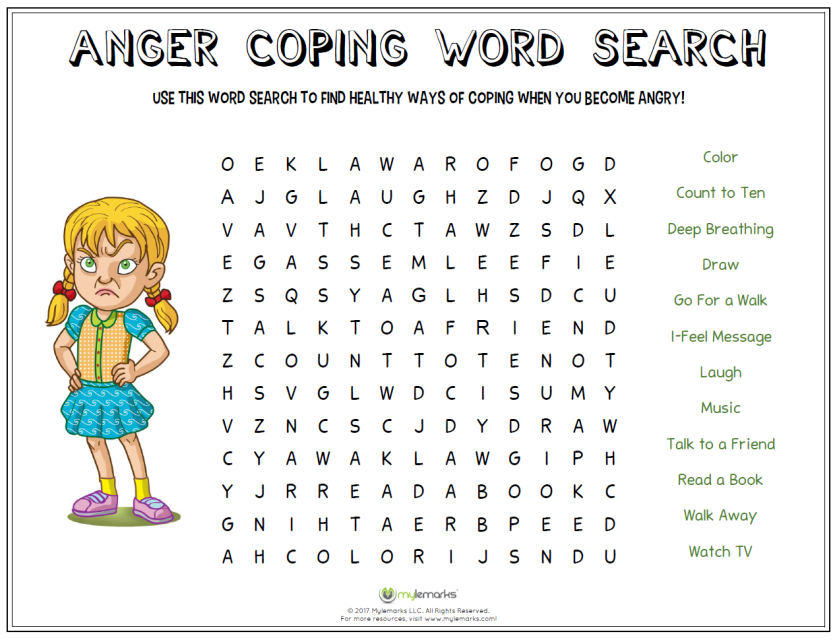
Ask why your counterpart behaves the way he does.
Instead of confrontation, ask sincerely why he does what he does. Chances are, the person you're mad at isn't deliberately trying to hurt you. Try to understand him before you blame him.
5. Express empathy
By putting yourself in the other person's shoes and asking "why" instead of assuming the worst, you communicate openly and respect the other person's right to think, feel, and act in a certain way. As a result, you build deeper relationships based on empathy.
In response to aggression, a person is forced to defend himself and respond in the same spirit, but in this case he feels safe and is able to hear your point of view.
6. Learn to communicate correctly
Express your opinion using "I-messages", talk about how you feel. But do not limit yourself to this, otherwise your view of the situation will remain one-sided.
Ask the interlocutor to share his point of view, try to hear him and come to some kind of compromise together. Show genuine interest and don't take a diatribe.
How to keep the situation under control
Forced to associate with a passive-aggressive person? These simple tricks will help you avoid unnecessary stress and defend your boundaries.
1. Call a spade a spade
"Did you really want it to sound so aggressive?" - this direct question can quickly bring the attacker to his senses. Caught red-handed, he will most likely hasten to answer: “No, what are you!” Then, if you like, elaborate on what upsets him. Offer to talk calmly and kindly about how he feels.
2. Ignore his attacks
If the interlocutor is openly hostile towards you, then you are not at all obliged to follow his lead. If you can let go of the situation and not attach importance to his attacks, you can’t imagine a better way out.
3. Show compassion and forgiveness
A passive-aggressive (or aggressive) person is clearly angry and tense.
